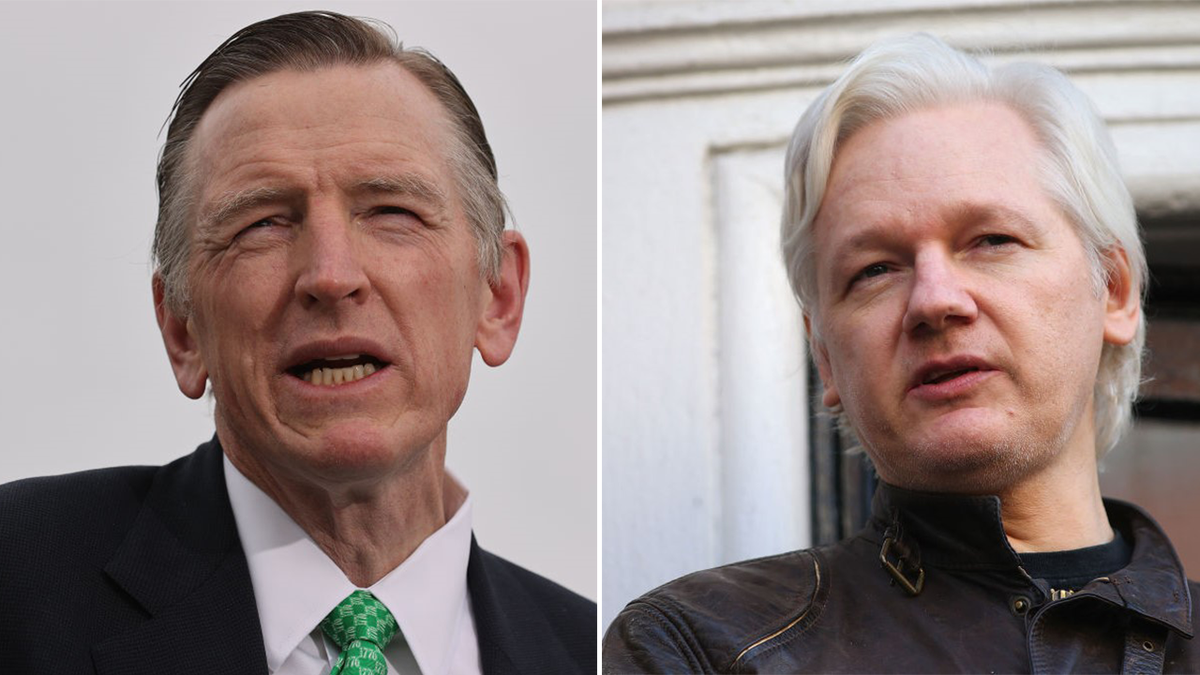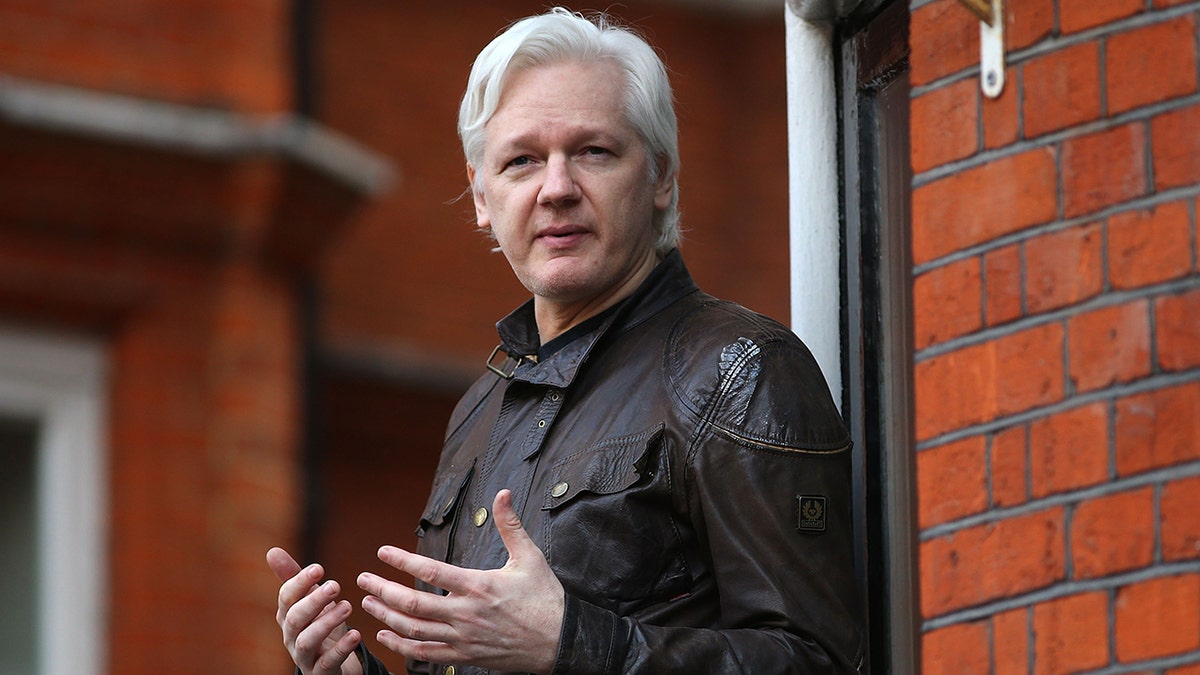Rep. Paul Gosar, R-Ariz., introduced a resolution expressing that “regular journalistic activities” are protected by the First Amendment and that the U.S. government should end its prosecution against Wikileaks founder Julian Assange, who is accused of publishing classified U.S. military documents.
The bipartisan resolution introduced Wednesday was co-sponsored by Reps. James McGovern, D-Mass.; Thomas Massie, R-Ky.; Marjorie Taylor Greene, R-Ga.; Anna Paulina Luna, R-Fla.; Eric Bulsison, R-Mo.; Jeff Duncan, R-S.C.; Ilhan Omar, D-Minn., and Clay Higgins, D-La.
“Whereas regular journalistic activities, including the obtainment and publication of information, are protected under the First Amendment to the Constitution of the United States,” the resolution reads.
Assange is facing 17 charges for allegedly receiving, possessing and communicating classified information to the public under the Espionage Act and one charge alleging a conspiracy to commit computer intrusion. The charges were brought by the Trump administration in connection with the 2010 publication of cables U.S. Army intelligence analyst Chelsea Manning leaked to Wikileaks detailing war crimes committed by the U.S. government in the Guantánamo Bay, Cuba, detention camp, Iraq and Afghanistan. The materials also exposed instances of the CIA engaging in torture and rendition.
SQUAD AND MARJORIE TAYLOR GREENE JOIN 16 LAWMAKERS CALLING ON BIDEN TO FREE ASSANGE

Rep. Paul Gosar (left) introduced a resolution expressing that the U.S. government should end its prosecution against Wikileaks founder Julian Assange. (Getty)
Wikileaks’ “Collateral Murder” video showing the U.S. military gunning down civilians in Iraq, including two Reuters journalists, was also published 13 years ago.
The resolution cites that Assange, an Australian citizen, was charged by the U.S. government for the alleged conspiracy to commit computer intrusion on accusations he helped Manning access Defense Department computers without authorization even though Manning “already had access to the mentioned computer, that the purported breaching of the Defense Department computers was impossible, and that there was no proof Mr. Assange had any contact with” Manning.
“Whereas, in 2010, WikiLeaks, a media organization established by Julian Assange, published a cache of hundreds of thousands of pieces of information including Guantánamo Bay detainee assessment briefs, State Department cables, rules of engagement files, and other United States military reports,” the resolution said. “Whereas the disclosure of this information promoted public transparency through the exposure of the hiring of child prostitutes by Defense Department contractors, friendly fire incidents, human rights abuses, civilian killings, and United States use of psychological warfare.”
Assange has been held at London’s high-security Belmarsh Prison since he was removed from the Ecuadorian Embassy on April 11, 2019, for breaching bail conditions. He had sought asylum at the embassy since 2012 to avoid being sent to Sweden over allegations he raped two women because Sweden would not provide assurances it would protect him from extradition to the U.S. The investigations into the sexual assault allegations were eventually dropped.
If he is extradited to the U.S. after exhausting all his legal appeals, Assange would face trial in Alexandria, Virginia, and could be sentenced to up to 175 years in an American maximum-security prison.
The resolution comes after multiple other bipartisan efforts this year by lawmakers in the U.S. and Assange’s home country of Australia demanding the U.S. drop the charges and end its extradition requests.

If he is extradited to the U.S., Julian Assange could be sentenced to up to 175 years in an American maximum-security prison. (Getty)
Last month, more than a dozen U.S. lawmakers signed a letter spearheaded by McGovern and Massie that was sent to President Biden urging him to end the prosecution against Assange. In September, a delegation of Australian lawmakers visited Washington, D.C., to meet with U.S. officials and advocate for Assange’s freedom. And on the four-year anniversary of Assange’s arrest in April, Rep. Rashida Tlaib, D-Mich., led a letter to the Justice Department signed by some House members demanding it drop the charges.
In 2020, a similar resolution was introduced by Massie and former Rep. Tulsi Gabbard, who was a Democrat while in office, that defended the free press and called for the charges against Assange to be dropped. Massie has also previously sponsored bipartisan legislation to reform the Espionage Act and protect whistleblowers and journalists.
No publisher had been charged under the Espionage Act until Assange, which many press freedom advocates describe as a dangerous precedent intended to criminalize journalism. U.S. prosecutors and critics of Assange have argued WikiLeaks’ publication of classified material put the lives of U.S. allies at risk, but there is no evidence that publishing the documents put anyone in danger.
“Whereas the successful prosecution of Mr. Assange under the Espionage Act would set a precedent allowing the United States to prosecute and imprison journalists for First Amendment protected activities, including the obtainment and publication of information, something that occurs on a regular basis,” Wednesday’s resolution said. “Whereas First Amendment freedom of the press is essential to promote public transparency and is a crucial safeguard for our Republic.”
“Whereas numerous human rights, press freedom, and privacy rights advocates and organizations have disclosed their sincere and steadfast support for Mr. Assange,” the resolution added.
AUSTRALIAN PRIME MINISTER SAYS GOVERNMENT STANDS FIRM AGAINST US PROSECUTION OF JULIAN ASSANGE
Additionally, the editors and publishers of these U.S. and European outlets that worked with Assange on the publication of excerpts from more than 250,000 documents he obtained in the Cablegate leak — The Guardian, The New York Times, Le Monde, Der Spiegel and El País — wrote an open letter last year calling for the U.S. to drop the charges against Assange.
The Obama administration decided not to indict Assange in 2013 over WikiLeaks’ publishing the classified cables in 2010 because it would have had to also indict journalists from major news outlets who published the same materials. Former President Obama also commuted Manning’s 35-year sentence for violations of the Espionage Act and other offenses to seven years in January 2017, and Manning, who had been imprisoned since 2010, was released later that year.

Julian Assange is facing 17 charges for allegedly receiving, possessing and communicating classified information to the public under the Espionage Act and one charge alleging a conspiracy to commit computer intrusion. (Fox News Digital/Landon Mion)
But Former President Trump’s Justice Department later moved to indict Assange under the Espionage Act, and the Biden administration has continued to pursue his prosecution.
During the Trump administration, the CIA allegedly had plans to kill Assange over the publication of sensitive agency hacking tools known as “Vault 7,” which the agency said represented “the largest data loss in CIA history,” Yahoo reported in 2021. The agency was accused of having discussions “at the highest levels” of the administration about plans to assassinate Assange in London and followed orders from then-CIA director Mike Pompeo to draw up kill “sketches” and “options.”
CLICK HERE TO GET THE FOX NEWS APP
The CIA also had advanced plans to kidnap and rendition Assange and had made a political decision to charge him, according to the report.
WikiLeaks also published internal communications in 2016 between the Democratic National Committee and presidential candidate Hillary Clinton’s campaign that revealed the DNC’s attempts to boost Clinton in that year’s Democratic primary.
Gosar’s resolution expresses that “regular journalistic activities, including the obtainment and publication of information are protected under the First Amendment of the Constitution of the United States,” that “First Amendment freedom of the press promotes public transparency and is crucial for the American Republic,” that the “Federal Government ought to drop all charges against and attempts to extradite Julian Assange” and that the “Federal Government allow Julian Assange to return home to his native Australia if he so desires.”